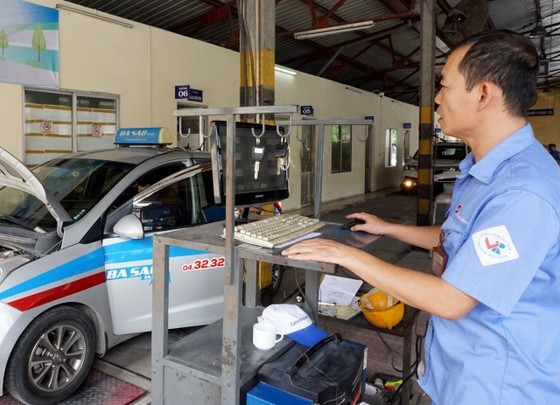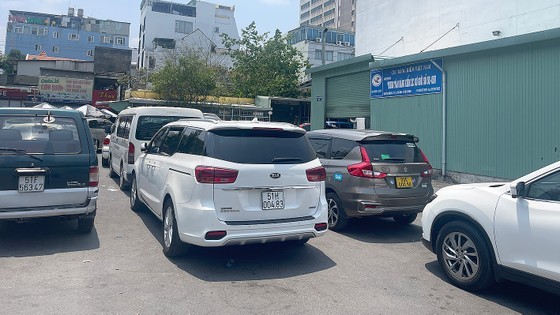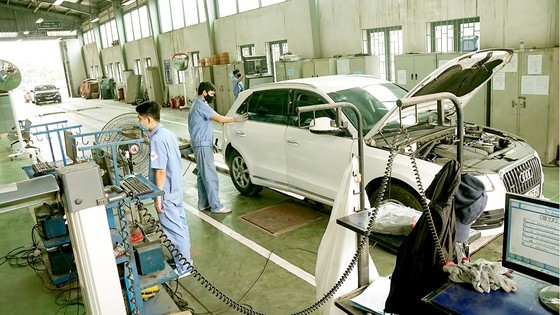 |
Circular No.02 stipulates the exemption of first-time inspection for new vehicles. (Photo: SGGP) |
While the authorities are optimistic about the new regulations, many people and businesses remain confused.
On March 22, the first day of its implementation, registration centers nationwide were crowded with people waiting in lines to register their vehicles. For instance, at the 50-05V Vehicle Inspection Center Hong Ha Branch in Tan Binh District, Ho Chi Minh City, many new vehicles that have already been registered for number plates but have not yet received their first-time inspection stickers are still being brought in for registration.
Circular No.02 states that new vehicles do not require inspection, but the center still issued more than 100 queue numbers for vehicle inspection on March 22. Likewise, many vehicles waited in lines for inspection at the 50-02S Vehicle Inspection Center in District 11 and the 50-04V Vehicle Inspection Center in Thu Duc City.
 |
Cars wait for inspection at the 50-05V Vehicle Inspection Center Hong Ha Branch in Tan Binh District, HCMC. (Photo: SGGP) |
On the same day, there were still long queues of vehicles waiting to register at the 43-04D Vehicle Inspection Center in Hoa Tho Tay Ward, Cam Le District, Da Nang City. Currently, the center only operates with two lines and six inspectors and can process about 70-80 vehicles daily. A representative of the center stated that they were taken by surprise by the implementation of Circular No.02 and were still adjusting to the new declaration form.
Mr. Nguyen Van Thanh, former Chairman of the Vietnam Automobile Transport Association, commented that with approximately 2 million vehicles in the transportation industry across the country, the fact that Circular No.02 stipulates the exemption of first-time inspection for new vehicles and extended inspection cycles for certain types of vehicles would significantly save time and costs for business owners.
People, businesses remain worried
However, Mr. Nguyen To An, Deputy Director of the Vietnam Register, said that in 2023, approximately 500,000 new vehicles would be exempt from the first-time inspection under Circular No.02. Additionally, over 3.2 million out of 5 million cars in the country will have their inspection cycle extended, which will provide many benefits in terms of time, money, and effort for both people and businesses.
When asked whether vehicles that are nearing the end of the inspection cycle can automatically extend the cycle, Mr. Nguyen To An explained that Circular No.02 states that vehicles that have been inspected before the circular takes effect are still required to go to the registration center for inspection when the inspection period expires. After reviewing the dossier, determining which group the vehicle belongs to, and which corresponding inspection cycle is applied, the registration center will issue a registration certificate according to the new regulations.
 |
Inspectors check vehicles at a vehicle inspection center in Hanoi. (Photo: SGGP) |
Despite the positive impact of Circular No.02, many transport business owners and car owners cannot help but wonder when the number of vehicles with unchanged and extended inspection cycles is fairly small. For instance, passenger cars with over nine seats and a production period of over five years still have a 6-month inspection cycle, while trucks and tractors that have been converted into specialized vehicles with a production period of over 15 years can only extend from three months to six months.
Addressing these concerns, Mr. Nguyen To An explained that these are groups of vehicles with a high frequency of use and many potential safety risks. In fact, there have been many accidents caused by passenger cars, school buses, and employee shuttles that have been in use for over 15 years, and countries around the world still impose strict inspection requirements on this group of vehicles.
Many transport enterprises have assessed that Circular No.02 only provides a small relief as new vehicles do not require registration. Vehicles that have already undergone inspection under the previous cycle still need to be registered, which takes about a year to complete for the current number of vehicles.
Moreover, although the registration cycle has been extended, the number of vehicles continues to increase, leading to registration expiration occurring at the same time and causing overload. To solve this problem fundamentally, the Ministry of Transport and relevant ministries should develop a plan to reopen registration centers.
* According to Mr. Duong Viet Hong, Director of the 60-01S Vehicle Registration Center in Bien Hoa City, Dong Nai Province, the center inspects 200-250 vehicles daily and also receives documents for first-time inspection. Since Circular No.02 is newly deployed, the center will study it while applying it to improve the registration process. The exemption from first registration and the extension of the inspection cycle for some types of vehicles have helped to alleviate the overload at registration centers, which has been a persistent issue for many months.
* According to Mr. Nguyen Huu Tai, Director of the 83-01V Vehicle Registration Sub-Department in Soc Trang Province, the implementation of Circular No.02 is timely and necessary, meeting the expectations of many people. The circular only changes the regulations on the first-time inspection exemption for new vehicles and extends the inspection cycle, making it easy for inspectors to apply and operate effectively and efficiently.
























